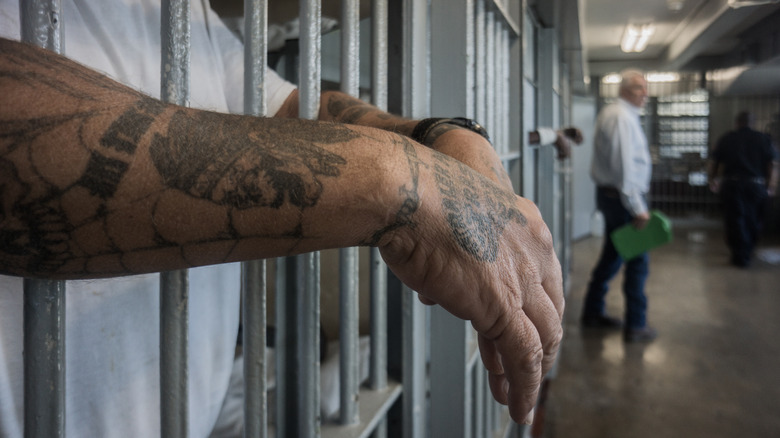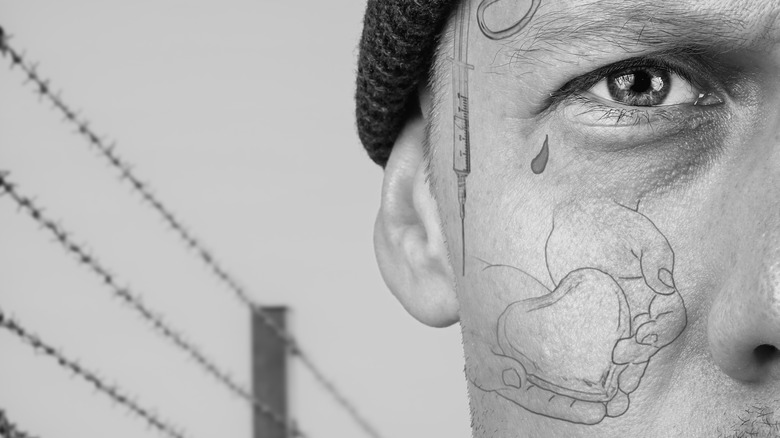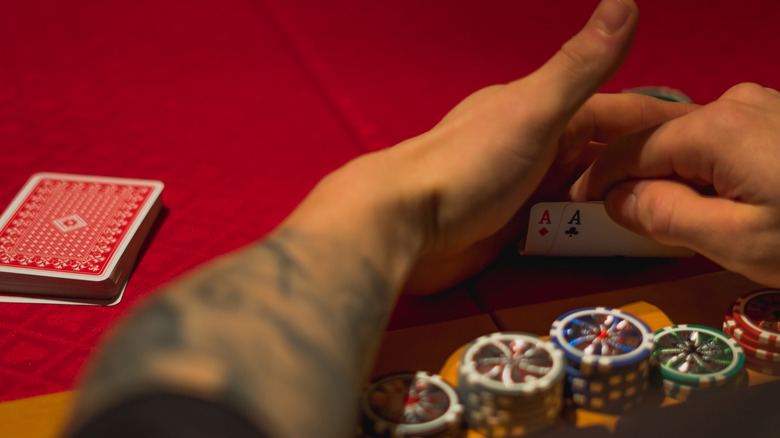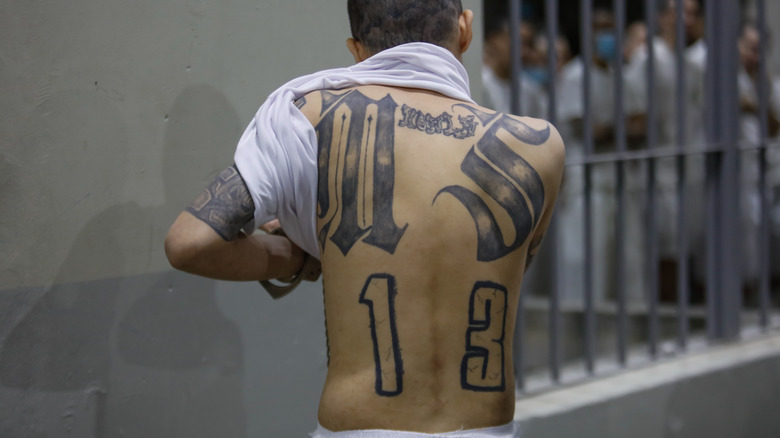The Real Meaning Behind These Prison Tattoos
Let's be honest: If you see someone with a teardrop tattoo walking down the street who isn't Lil' Wayne, it's probably best to not go up and say, "Hey, how'd you get your tattoo?" The person might tilt their head and say, "I murdered someone, bro," and merc you on the spot — if they didn't take to rehabilitation, that is. Or maybe the teardrop isn't filled in, in which case the tattoo represents an attempted murder. Or maybe there's a bunch of teardrops together, and ... Okay, full disclaimer: We're all pretenders when it comes to prison rules, society, tattoos, etc., unless someone's been there. The meanings of prison tattoos aren't exactly as straightforward as dictionary definitions of words and vary from place to place and person to person.
Nonetheless, some tattoos are common enough that their general meaning is more or less known to those not inked behind bars. Prison tattoos are so common, in general, that it might seem odd to see someone finish a prison term — ripped beyond reason, of course — and not have any tattoos across the body. Prison life and tattoos seem to go hand-in-hand. This is true not only in the United States, but across the world, whether to denote tribal loyalty to a certain group, express some personal sentiment, or just look all fancy while dozing in your bunk. At this point, tattoos like playing cards, spiderwebs, certain initials, crosses on chests, and teardrops have pretty clear-cut meanings that are fairly widely known.
Teardrops mean murder
Because we already mentioned it, we might as well start our list with teardrop tattoos. No, teardrops don't mean that an inmate is having a big 'ole cry about doing bad things. No, it doesn't mean that sad clown is on the list of backup careers. And no, you should not — repeat, not — get one for kicks outside of prison because you want the whole world to know how hard you are. This is because, as Minutes Before Six says, teardrops don't have the oomph that they used to have. Veteran convicts — who harbor a stricter interpretation of tattoo symbolism — can spot a poser a mile away.
The supposed "traditional" meaning — if we can use the term — of a teardrop near the eye is that the person sporting the teardrop killed someone. Two teardrops mean two kills, three means three, etc., as TatRing explains. Teardrops can also represent mourning for a fellow gang member, while an outlined and not-filled-in teardrop can represent mourning for a friend behind bars. An outlined teardrop can also mean an attempted, but unsuccessful, murder. Also, family members of those inside the prison might get an outlined teardrop to indicate mourning for the one behind bars. On top of all this, the side of the face holds some apparently secret significance. No doubt there are also plenty of other interpretations and meanings. But, we're betting that some folks don't care about all this complex ritualism and just think it looks cool.
Addicted to gambling
Cards games sure are fun, right? I mean, you've got serious games like poker, simple games like war, plus rummy, cribbage, solitaire, and lots more. And if you've gone to jail for something gambling-related, or just wound up in jail as a person who likes to gamble, then you're in luck: You can get a full card, or just a card suit, permanently inscribed in your flesh on a variety of body parts that may or may not include the knuckles. Plus, if you're in Russia and someone holds you down against your will and carves a red heart into your skin, you'll be a prime amorous candidate for other lonely prisoners. Ain't prison life grand?
So yes, all of the above is true. In its simplest form, playing card tattoos mean that the tattoo wearer has a problem with, even addiction to, gambling, per Corrections 1. Or more abstractly, the person might see life as a gamble. Or, as TatRing says, it might indicate that the person believes they got served a raw deal on the way to prison.
And because we've seen that tattoo meanings can get complex, Corrections 1 also explains that playing card tattoos apparently take on extra meanings in Russian prisons. Different suits mean different things: spades mean theft, diamonds mean police informants (dangerous for the prisoner), and clubs are for the generally criminal. Also, we mentioned hearts, which may or may not get inked into a prisoner against his will.
Cobwebs signify a long prison term
Cobwebs aren't something you want to accidentally walk into and get stuck on your skin, in your mouth, or whatever. Plus, if you accidentally tear one down you might snag a spider with it. And then the spider lands in your hair, scurries to the back of your neck, and ... zap! You've got a spider bite on the neck, you're frantically batting away at your head, and you vow to never step foot again in a forest, ever, ever — or wherever it was that you walked into the cobweb.
So, taking that story into account, can we take a guess at what a cobweb tattoo on a convict's body means? As Corrections 1 explains, a cobweb tattoo means that an inmate is a spider that snares its prey. Or, much like the playing card entry in this list, it signifies how the prisoner feels about being in prison, i.e., trapped. Less intuitively, it also might mean that an inmate has a long-term sentence, or is a prison lifer and/or repeat offender. Maybe they're "stuck" in the prison system, so to speak.
Interestingly, cobweb tattoos often show up on the elbows. Maybe it just looks nifty for the elbow to be the center of the web. Or, as our story above describes, cobweb tattoos might show up on that most sensitive of spots where a spider secretly snuck onto your body: the back of the neck.
Initials with lots of different meanings
There are numerous tattoo initials that a prisoner could get inked on the skin — as many as there are phrases in a given language, really. And yet, some initials are common enough for us to know the meanings. We don't mean whole words like "love" or "hate," by the way. We also don't mean acronyms, which use the first letters of words to make a new, grammatically correct word, like PIN: personal identification number. Many, if not most, websites mistakenly call initials acronyms. C.I.A., for instance, is not an acronym but a set of initials because no one pronounces it "See-ah."
Unbelievable Facts outlines three common initials that often show up on prisoners. "EWMN" stands at the top of the list, and means, "evil, wicked, mean, nasty" — sometimes it's tattooed on the knuckles. "MS 13" is another example that indicates allegiance to the Mara Salvatrucha Latin gang, which was formed in LA by immigrants from El Salvador in the 1980s. Then there's "A.C.A.B.," a tattoo originating in Britain that means "All cops are bastards." Corrections 1, however, says that some people think that A.C.A.B. means "Always carry a Bible." There's no telling whether or not the latter meaning is a good thing or would just earn the wearer a beat down. Finally, as Living a Lot says, "AB" means "Aryan Brotherhood," a very obviously racially-charged pair of initials.
A high-ranking criminal cross-wearer
Before we end, let's point out that there are loads of common tattoos that didn't make the cut in this article: three dots, five dots, clocks with no hands, crowns, shamrocks, chains, and so forth. We know prison tattoo supplies are limited, but we can get more inventive than that, can't we people? Time to think outside the box, or ... cell.
Anyway, the final entry in our list comes to us from where is perhaps the number one country where you don't want to be tossed in prison: Russia. Vice interviewed Damon Murray, co-publisher of "Russian Criminal Tattoo Police Files," which compiled photos taken of Russian inmates' tattoos from the 1960s through the 1980s by Arkady Bronnikov, who is regarded as Russia's leading expert on tattoo iconography. Murray said that crosses on the chest are amongst the most common tattoos that inmates choose. Ultimately, it's another symbol of loyalty, this time to the greater clan of thieves. And perhaps because it's a cross — a symbol associated with Christianity, the sacrifice of Jesus to atone for humanity's sins, etc. — it indicates that the person is blameless and pure before one's thieving community.
Living a Lot points out that crosses lost their original, Russian meaning once they made the cross-continental jump to the United States and other places. In Christian-majority countries, as we've alluded to, folks who see a cross would likely immediately think of Christianity. And yet, at this point, there does seem to be an overall, agreed upon, international meaning for crosses on chests: being a high-ranking member of an organized crime outfit.





